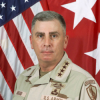John Abizaid

John Abizaid
John Philip Abizaidis a retired United States Army general and former U.S. Central Commandcommander, overseeing American military operations in a 27-country region, from the Horn of Africa, the Arabian Peninsula, to South and Central Asia, covering much of the Middle East. CENTCOM oversees 250,000 US troops. Abizaid succeeded General Tommy Franks as Commander, USCENTCOM, on July 7, 2003, and was also elevated to the rank of four-star general the same week. He was succeeded by Admiral William J. Fallon on...
NationalityAmerican
ProfessionSoldier
Date of Birth1 April 1951
CountryUnited States of America
We've spent too much time over the last couple of years talking about the Kurds and the Shia and the Sunnis. We've got to start talking about Iraqis,
If there is anything that demonstrates to people the difference between what we stand for and what they stand for, it ought to be pretty apparent to them what it is,
Clearly, we understand that we've got an enemy that's in for the long term, al-Qaida and the associated groups that are aligned with it, ... We know that they've got a long-term strategy to fight, to gain ground, to gain influence. And it's very very clear that we've got to have the same sort of long term strategy to contest it. But the keystone to this strategy is helping the people in the region help themselves.
In terms of comparison from six months ago, in terms of foreign fighters, I believe there are more foreign fighters coming into Iraq than there were six months ago, ... In terms of overall strength of the insurgency, I would say it is the same as it was.
In terms of overall strength of the insurgency, I would say it is the same as it was,
I don't know if I would make any comment about that other than to say that there is a lot of work against the insurgency,
I know you have a lot of work ahead of you. I will continue to work with you all the way.
I do think there is a general lack of understanding in the United States as to how it's going,
The attacks against coalition forces have definitely gone down. Our attacks against the enemy have gone up. Attacks against civilians over time has gone up,
It's also natural in that part of the world to blame what people view as the... as the most important authority in the region, and that currently is the United States of America.
It makes sense that as NATO forces go in, and they're more in numbers, that we could drop some of the U.S. requirements somewhat,
The international community needs to continue to help and you can certainly count on the United States to continue to help as well,
I don't believe Iran is a suicide state.
Nobody's more mindful of the sacrifices of our troops than those of us that command them.